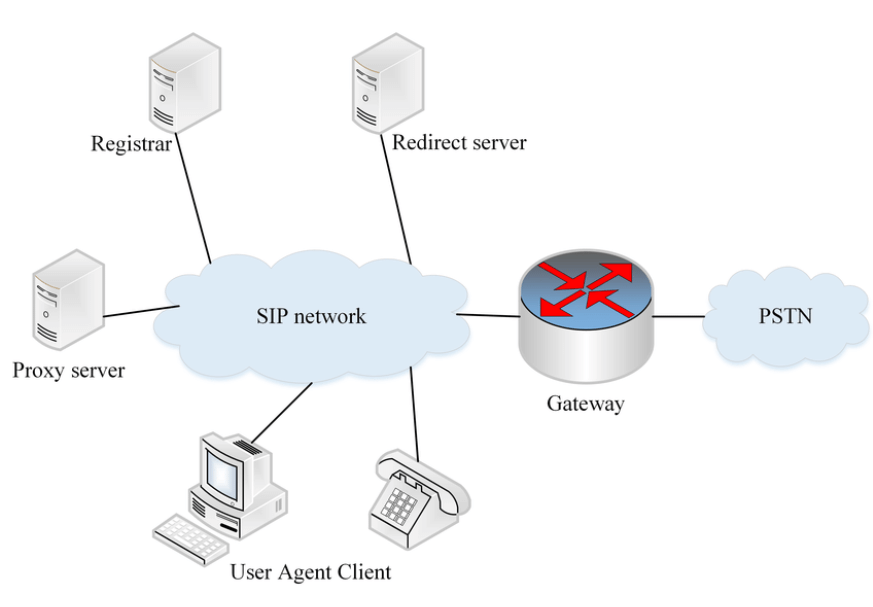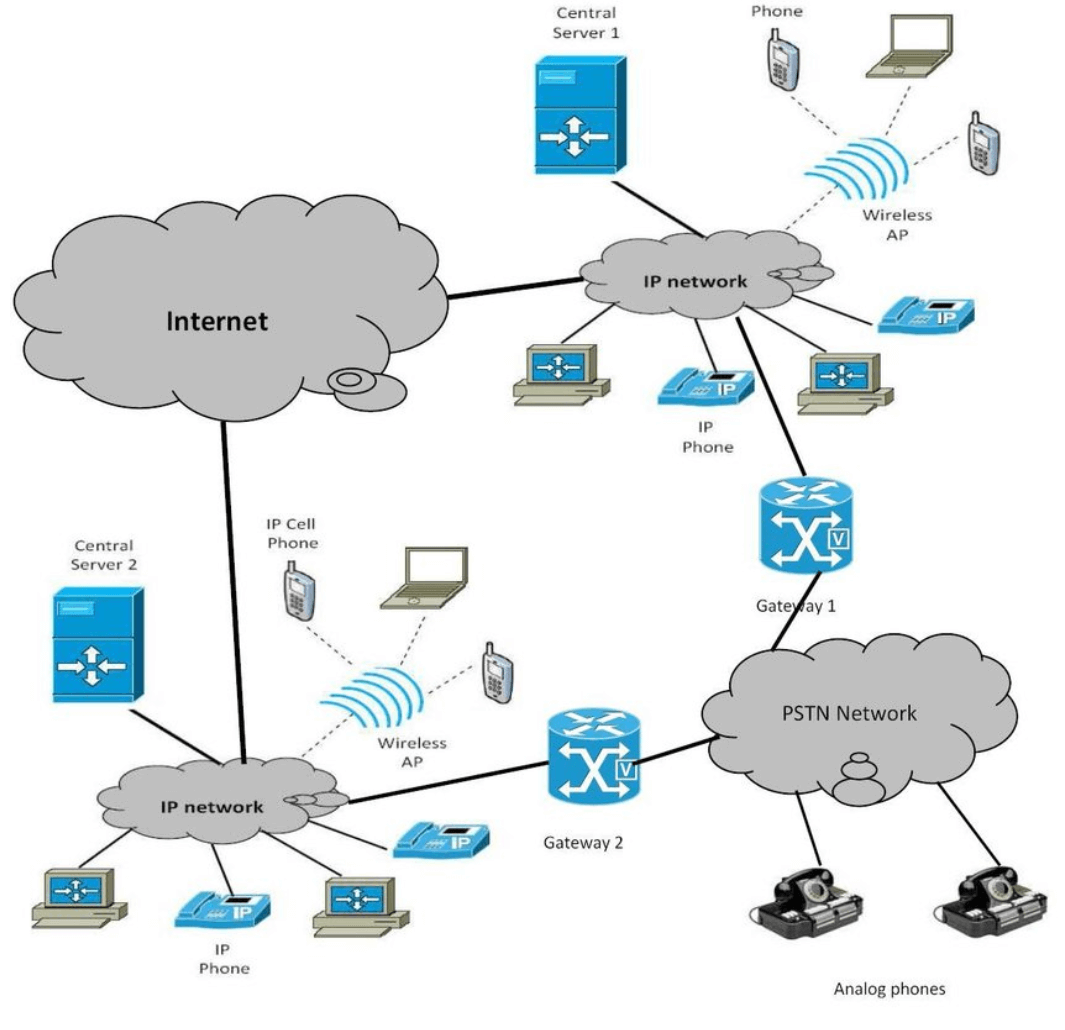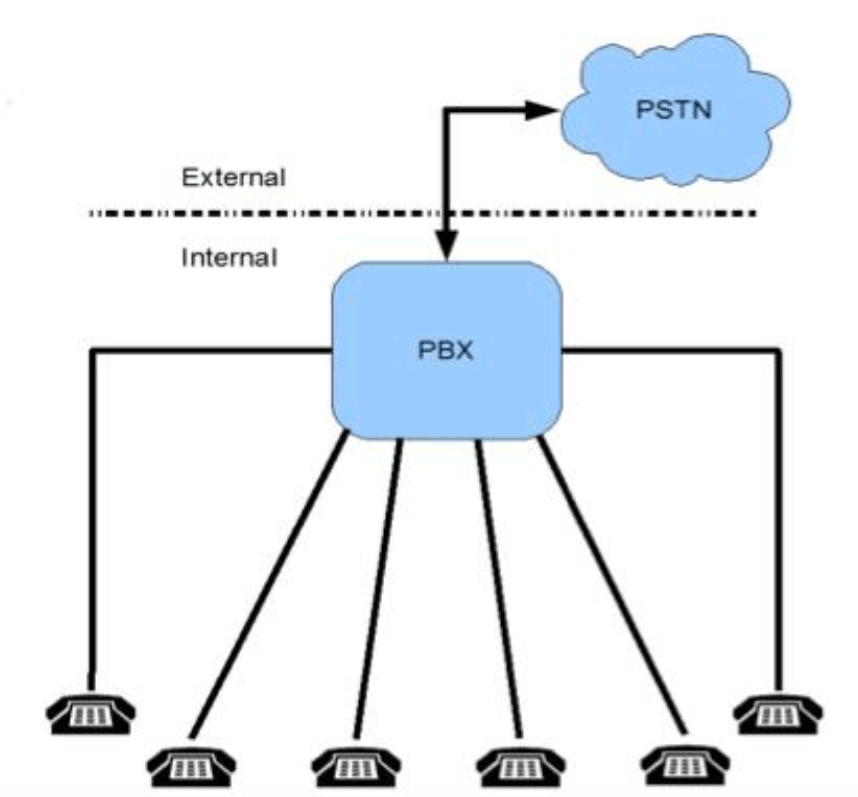In today’s dynamic and interconnected world of UK business, effective communication lies at the heart of success and that’s where SIP vs VoIP vs PBX dilemma comes into play. Whether you’re a budding startup or an established enterprise, having a reliable and robust business telephony system is pivotal for ensuring smooth operations, surpassing customer expectations, and outshining competitors. It’s widely recognised that when customers face issues, their strong inclination is toward human-to-human interactions for effective resolution. Phone calls (62%), along with email (46%) and chat (37%), hold significant importance in meeting customer expectations, surpassing the effectiveness of self-service options (14%) or relying on bots (13%) (Source).
To make an informed decision, let’s delve into the three pivotal telephony solutions: SIP, VoIP, and PBX. SIP, also known as Session Initiation Protocol, empowers businesses to engage in voice, video, and messaging services over an IP network. Its flexible and scalable nature allows organisations to streamline their communication infrastructure, adapting effortlessly to evolving needs. On the other hand, VoIP, or Voice over Internet Protocol, utilises the power of the internet to transmit voice calls, bypassing traditional phone lines. VoIP offers cost savings, advanced features, and seamless integration with digital systems, enabling businesses to embrace efficient and future-proof communication practices. Lastly, there’s PBX, which stands for Private Branch Exchange—an on-premises telephony system that handles internal calls and facilitates connections to external lines. PBX grants businesses a sense of control, enhanced security measures, and the ability to customise their communication framework to perfection.
Our objective with this blog post is to serve as a trusted guide for UK businesses seeking the most fitting telephony solution. We’ll explore the features, advantages, and potential drawbacks of SIP, VoIP, and PBX, equipping you with the knowledge necessary to make an informed decision that aligns precisely with your specific business requirements, budget constraints, and future growth aspirations.
SIP VS VOIP VS PBX
SIP (Session Initiation Protocol)

Source: researchgate.net
What is SIP and how does it work?
SIP, in essence, is a communication protocol that facilitates voice, video, and messaging services over an IP network. Its primary function is to initiate, modify, and terminate real-time sessions between multiple participants. By leveraging SIP, businesses can establish connections and engage in seamless communication across various endpoints, such as phones, computers, and other devices. SIP operates by initiating session requests and responses, allowing for the exchange of multimedia data between participants. It works hand in hand with other protocols, such as RTP (Real-Time Transport Protocol), to ensure the smooth transmission of voice and video streams. The underlying principle of SIP lies in its ability to establish and manage communication sessions, enabling businesses to connect and collaborate effortlessly.
Key features of SIP for business telephony
▶ Flexibility: SIP offers businesses remarkable flexibility by enabling them to adapt and scale their communication infrastructure to meet evolving needs. Its versatile nature allows for easy integration with existing systems, ensuring a smooth transition and reduced downtime.
▶ Rich Media Support: A significant advantage of SIP is its support for various communication methods. From voice calls to video conferences and instant messaging, SIP provides businesses with a comprehensive suite of tools for effective collaboration and enhanced productivity.
▶ Presence and Availability: SIP incorporates presence functionality, allowing users to view the availability and status of their contacts in real-time. This feature promotes efficient communication and reduces response times, enabling teams to work seamlessly together.
▶ Cost Savings: SIP enables businesses to achieve substantial cost savings. By converging voice and data networks, companies can eliminate the need for separate infrastructures and reduce maintenance expenses. This streamlined approach not only saves money but also simplifies management processes.
Pros and cons of SIP
| Pros | Cons |
|---|---|
| Cost Efficiency | Dependence on Internet Connection |
| Flexibility | Emergency Services Limitations |
| Feature-rich |
Benefits of SIP for UK businesses
▶ Cost Efficiency: SIP enables businesses to optimise their communication costs. By eliminating the need for separate voice and data networks, SIP significantly reduces infrastructure expenses and ongoing maintenance costs.
▶ Enhanced Mobility: With SIP, employees can stay connected and communicate effectively from anywhere, using their preferred devices. This mobility empowers businesses to embrace flexible work arrangements and leverage remote work opportunities.
▶ Scalability: SIP provides businesses with the flexibility to start with a minimal setup and scale their communication systems as they grow. This scalability ensures that the telephony solution can adapt to changing business needs and accommodate future expansion plans.
▶ Improved Customer Experience: By harnessing SIP’s rich media support and collaboration features, UK businesses can provide exceptional customer service. Efficient communication and quicker response times contribute to enhanced customer satisfaction and loyalty.
VoIP (Voice over Internet Protocol)

Source: researchgate.net
What is VoIP and how does it work?
VoIP is a communication technology that enables voice calls to be transmitted over the internet, bypassing traditional phone lines. Instead of using analog signals, VoIP converts voice into digital data packets that are transmitted through IP networks. These packets are then reassembled at the receiving end, allowing users to engage in clear and seamless voice conversations. VoIP works by utilising the existing internet infrastructure to transmit voice data in real-time. This technology leverages the power of packet-switched networks, enabling businesses to make cost-effective voice calls using their internet connection. Whether through dedicated VoIP phones or software-based solutions, VoIP offers a flexible and efficient means of communication.
Key features of VoIP for business telephony
▶ Cost Savings: One of the primary advantages of VoIP is its potential for cost savings. By utilising the internet for voice calls, businesses can avoid expensive long-distance charges and enjoy reduced telecommunication costs.
▶ Advanced Features: VoIP brings a wealth of advanced features to business telephony. These features include call forwarding, voicemail-to-email transcription, conference calling, and integration with other digital communication tools, enhancing productivity and efficiency.
▶ Scalability: VoIP is highly scalable, allowing businesses to easily add or remove phone lines based on their needs. This flexibility makes it suitable for both small and large organisations, enabling seamless growth and adaptation.
▶ Mobility: With VoIP, businesses can achieve enhanced mobility. Employees can make and receive calls using their smartphones or laptops, enabling them to stay connected and collaborate regardless of their physical location.
Pros and cons of VoIP
| Pros | Cons |
|---|---|
| Cost Efficiency | Dependence on Internet Connection |
| Flexibility | Emergency Services Limitations |
| Feature-rich |
Benefits of VoIP for UK businesses
▶ Cost Savings: VoIP enables businesses to reduce their telecommunication costs significantly. By leveraging the internet for voice calls, businesses can eliminate or minimise long-distance charges, resulting in substantial savings.
▶ Scalability and Flexibility: With VoIP, businesses have the flexibility to scale their communication systems as they grow. It is easy to add or remove phone lines, ensuring that the telephony solution aligns with their evolving needs.
▶ Enhanced Collaboration: VoIP’s advanced features, such as conference calling and voicemail-to-email transcription, enhance collaboration and streamline communication within teams, driving productivity and efficiency.
▶ Geographical Flexibility: VoIP allows UK businesses to transcend geographical barriers. With remote work becoming increasingly prevalent, VoIP enables employees to stay connected and maintain seamless communication regardless of their location.
PBX (Private Branch Exchange)

Source: researchgate.net
What is PBX and how does it work?
PBX, or Private Branch Exchange, is a telephony system that manages internal calls within an organisation and connects them to external lines. It serves as a private telephone network within a business, facilitating communication between employees and external parties. PBX works by establishing and maintaining connections between internal and external calls. It utilises a combination of hardware and software components to manage call routing, call forwarding, voicemail, and other telephony features. By incorporating extensions and direct inward dialing (DID) numbers, PBX allows for internal call transfers and external call handling.
Key features of PBX for business telephony
▶ Control and Security: With PBX, businesses have full control over their telephony system. They can manage call routing, set permissions, and implement security measures to protect sensitive communications.
▶ Customisation Options: PBX provides businesses with the flexibility to customise their telephony features. They can create personalised voicemail greetings, set up call forwarding rules, and establish call queues based on their specific needs.
▶ Integration Capabilities: PBX can integrate with other business applications, such as customer relationship management (CRM) systems or helpdesk software, enabling seamless workflows and improving overall efficiency.
▶ Reliability: PBX systems are known for their high reliability. By hosting the telephony system on-premises, businesses can maintain communication continuity even in the event of internet or service provider disruptions.
Pros and cons of PBX
| Pros | Cons |
|---|---|
| Control and Flexibility | Higher Initial Investment |
| Enhanced Security | Maintenance and Upgrades |
| Reliability |
Benefits of PBX for UK businesses
▶ Control and Customisation: PBX provides businesses with full control over their telephony system. They can tailor the system to their specific needs, creating a customised communication framework that aligns with their unique requirements.
▶ Scalability: PBX allows businesses to scale their telephony system as they grow. They can easily add or remove extensions, ensuring that the system can adapt to their evolving communication needs.
▶ Improved Collaboration: PBX systems offer features like call transfer and call queuing, enabling seamless collaboration and efficient call handling within teams.
▶ Cost Savings: Over time, PBX systems can result in cost savings for businesses, especially when compared to traditional telephone systems. By eliminating per-line charges and leveraging internet connectivity, PBX helps reduce communication expenses.
SIP VS VOIP VS PBX: A COMPARATIVE ANALYSIS TABLE
| Criteria | SIP | VoIP | PBX |
|---|---|---|---|
| Cost (Monthly per user, GBP) | 15-40 | 5-40 | 20-35 |
| Scalability (1-10) | 9 | 9 | 6 |
| Flexibility (1-10) | 9 | 9 | 5 |
| Features and Functionality (1-10) | 9 | 9 | 7 |
| Quality of Service (QoS) (1-10) | 8 | 7 | 9 |
| Reliability and Uptime (1-10) | 8 | 7 | 9 |
| Integration Capabilities (1-10) | 9 | 8 | 5 |
| User Experience (1-10) | 8 | 9 | 7 |
| Support and Customer Service (1-10) | 7 | 7 | 8 |
| Compliance and Security (1-10) | 9 | 7 | 9 |
| Installation Process (1-10, lower = easier) | 6 | 4 | 8 |
| Vendor Reputation (1-10) | 8 | 7 | 8 |
| Mobility Features (1-10) | 9 | 9 | 5 |
| Training and Ease of Use (1-10) | 7 | 8 | 6 |
| Future-Proof Technology (1-10) | 9 | 9 | 6 |
SELECTING THE BEST TELEPHONY SOLUTION FOR A UK BUSINESS
| Business Size | SIP | VoIP | PBX |
|---|---|---|---|
| Small Business | Suitable | Highly Suitable | Less Suitable |
| Medium Business | Highly Suitable | Highly Suitable | Suitable |
| Large Business | Highly Suitable | Suitable | Highly Suitable |
VoIP emerges as the most suitable telephony solution for small businesses in the UK. Its low cost, flexibility, and scalability make it an ideal choice. With VoIP, small businesses can leverage the power of the internet to make cost-effective voice calls while enjoying advanced features and seamless integration with digital systems. On the other hand, traditional PBX systems may not be the most suitable option due to their high cost and lack of flexibility, which could limit the growth and adaptability of a small business.Medium UK Business
Medium businesses in the UK can benefit greatly from both SIP and VoIP telephony solutions. SIP offers scalability, advanced features, and integration capabilities, making it a highly suitable option. However, it is important to consider that SIP may be slightly more expensive compared to VoIP. VoIP, on the other hand, provides cost-effectiveness, flexibility, and a rich set of features, making it an excellent choice for medium businesses. Traditional PBX systems can also be considered if the business has the necessary resources and requirements for a robust, dedicated telephony system.Large UK Business
Large businesses in the UK often require robust and secure telephony systems to meet their complex communication needs. In this regard, both SIP and PBX systems are typically more suitable options. Large businesses have the resources and infrastructure to invest in and maintain comprehensive PBX systems, which offer full control, enhanced security, and customisation options. SIP, with its scalability, advanced features, and integration capabilities, is also a suitable choice for large businesses. While VoIP remains a cost-effective option with valuable features, large businesses may prioritise the additional control and security provided by SIP and PBX systems.
Why TWC is among the Best Business Telephony Providers in London
When it comes to selecting a reliable and top-notch business telephony provider in London, TWC IT Solutions emerges as a prominent leader in the telecommunications industry. TWC has not only established itself as a trusted partner for exceptional telephony solutions but has also been instrumental in supporting the growth of over 300 scaling SMEs in London and worldwide.
Contact TWC IT Solutions for a quote and transform your business telephony experience.
SIP VS VOIP VS PBX: WHICH IS THE RIGHT SOLUTION AFTER ALL?
While there isn’t a one-size-fits-all solution, each option brings its own set of advantages tailored to specific business needs. For small businesses, VoIP is often an attractive choice due to its cost-effectiveness, flexibility, and scalability. On the other hand, SIP offers advanced features and integrations, albeit at a potentially higher cost. Traditional PBX systems may not be the best fit for small businesses due to their inflexibility and higher expenses. For medium-sized businesses, a combination of SIP and VoIP can provide the best of both worlds. SIP brings scalability and advanced features, while VoIP offers cost-effectiveness and flexibility. As for large businesses, the scalability, advanced features, and enhanced security of SIP and PBX systems make them highly desirable options.
To make an informed decision, businesses should consider factors such as cost, scalability, flexibility, and security since by evaluating these aspects will empower businesses to choose a telephony solution that aligns precisely with their unique requirements, budget constraints, and growth aspirations.

